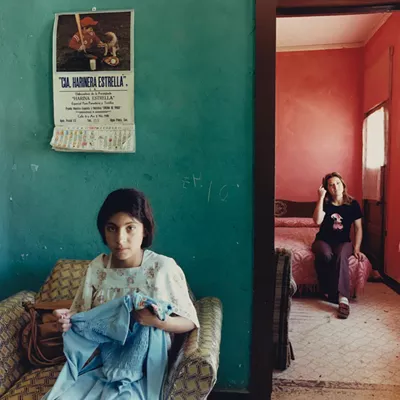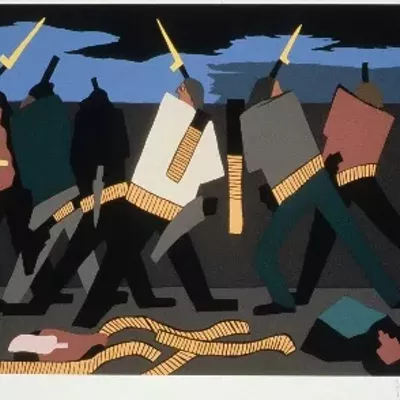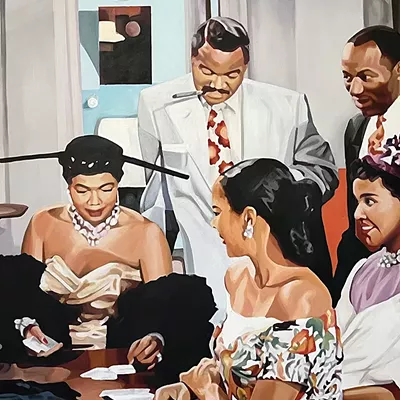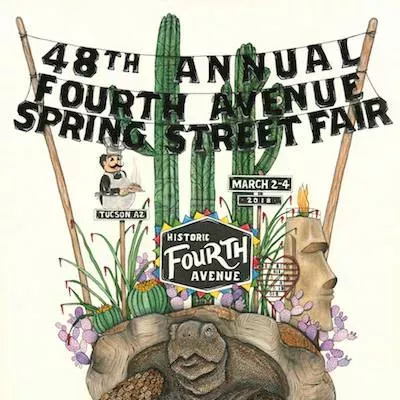CALL THEM DUELING Daniels. Or fighting Figaros. But they're just a couple of baritones out to deliver the best Figaro an opera singer can muster.
Daniel Belcher and Daniel Mobbs alternate the part of the feisty factotum in this weekend's Arizona Opera production of Il barbiere di Siviglia or The Barber of Seville, the beloved Rossini comedy that's one of the world's most popular operas. It's the tale of Figaro, the wily barber and jack of all trades who plots against the marriage schemes of the geezer Dr. Bartolo, and helps the lovely young Rosina marry his boss, Count Almaviva, instead.
Bobbs, who sang Marcello in the company's La Bohème two seasons ago, is the Figaro of Friday night and Sunday afternoon. Belcher, a newcomer to Arizona Opera, is the Saturday night barber.
On a sunny Tucson morning, the two Figaros send good-natured jabs at each other across a pair of coffees at a café.
"Oh, I like this," says Belcher, in mock horror. "The publicity person is telling everyone that I'm the short one and he's the tall one. But I have blond hair and he's gray."
"He's the better singer," the prematurely salt-and-pepper Mobbs breaks in graciously. Then adds in satisfaction: "I'm taller."
Offstage, the pair are congenial colleagues who have explored Tucson together in their off-rehearsal times. They drove to Mount Lemmon and near froze on the ski lift ("We had tank tops on!" exclaims Mobbs) and another day sweltered on a Sabino Canyon hike at high noon. One evening they headed off into a saguaro-studded sunset on a trail ride, and in between this weekend's Tucson performances and Phoenix's next, they hope to squeeze in a Grand Canyon hike.
The young men's physical fitness puts the lie to the old saw that opera is "a bunch of fat people who stand on the stage to sing," Mobbs says. "Now we're trained to do everything. It's become theater."
Both of them are young, athletic and still in love with the opera life, but onstage at the TCC Music Hall, the two Daniels will be wielding two different Figaros. "The basic staging is the same," explains Belcher, "but the way we deliver him is different."
Mobbs is 33 years old, a ballet dancer who switched to singing as a young man when recurring injuries warned him of the brevity of a dancer's career. He gave up a place in the Louisville Ballet but still finds inspiration in his movement training, noting, "I use every part of the music as a dancer would."
By contrast, Belcher, a 29-year-old Missouri native who now lives with his wife in Kansas City, was schooled in the broader popular arts. "I grew up doing musical theater," he says, and studied as an undergrad at a Baptist college in Kansas City. He went on to study for four years at Juilliard, while Mobbs trained at the Academy of Vocal Arts in Philadelphia. Both have since sung widely around the world, Belcher in such varying locations as Japan and Houston. This winter he'll make his European debut in Stuttgart, and next season he sings with New York City Opera.
Mobbs has sung in cities across Europe and America, including with New York City Opera. A veteran Figaro, he's sung the part no fewer than 84 times, the last in an odd South Africa production that transformed Figaro into a sleazy drug dealer. He pronounces himself relieved that Arizona Opera's version is a classic rendering, with appropriately sumptuous sets of Seville and "wacky" costumes that are "traditional with a twist." His rival, who can boast of several Figaro engagements, including at the Lake George Opera Festival, says, "Our jackets look like a barber pole, with red and white stripes."
The opera's story is set three years before the events in The Marriage of Figaro. That 1785 Mozart opera, staged by Arizona Opera last season, depicts Almaviva already bored with his marriage to Rosina, and Figaro with marital ambitions of his own. Both operas are based on the Figaro plays by the 18th-century French playwright Beaumarchais, whose depictions of a bumbling aristocracy got him into trouble with the censors in the years before the French Revolution. Il barbiere di Siviglia is mildly subversive, rooting as it does for society's usual underdogs. Rosina is a smart young woman determined to outwit her dim male guardian, and Figaro is infinitely more clever than the Count, his noble employer.
However, the 1816 Rossini opera, with an Italian libretto by Sterbini, is mostly a comic romp, one with glorious music. "It's a singer's piece," declares Belcher. "I love Figaro so much."
The character's opening aria is familiar even to non-opera fans, its rapid-fire "Figaro Figaro" lines having been immortalized, Mobbs points out, in the Bugs Bunny cartoon "The Rabbit of Seville."
"It's one of the most demanding arias in the entire baritone repertoire," he says. And it's crucial for drawing the audience in. "In the first 20 minutes in comedy you know if you've got the audience."
Both men appreciate the company's two and a half weeks of rehearsal time, which allows the singers, who travel here from all over the U.S. and Canada, to develop their characters fully in work with stage director Robert McQueen.
"Figaro is in his early 20s," Mobbs says. "He does everybody's hair and makeup in the town. In the opening aria he explains that everyone in town wants to ask him for a favor ... . The audience relates to Figaro the most ... . Once you win over the audience it's a blast."
Both singers agree that the opera, sung in Italian with English surtitles, is delightfully accessible. Performed with a live orchestra, the work has a running time of about two and a half hours.
"It's the best first opera," Mobbs says, "with the comedy, political satire and a character who speaks out and talks to the audience ... . I can say, 'Come to Barber. You'll get it. You'll have a great time.'"
And there's something else the Daniels can agree upon: an afternoon at Colossal Cave. Coffee quaffed, PR duties dispatched, off they go, a couple of Figaros in shorts and T-shirts, ready for a little spelunking in the desert's splendor.
Arizona Opera presents Il barbiere di Siviglia at 7:30 p.m. Friday and Saturday, October 6 and 7, and at 2 p.m. Sunday, October 8, at the TCC Music Hall, 260 S. Church Ave. Tickets are $19 to $69. Kirk Muspratt conducts the orchestra; the opera is sung in Italian with English surtitles. For reservations or more information call Arizona Opera at 321-1000, or the TCC at 791-4836.











